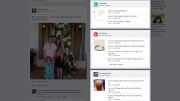 Facebook's Timelines are about to get a lot busier, with dozens of new apps allowed to automatically post updates on what their users are doing.
Facebook's Timelines are about to get a lot busier, with dozens of new apps allowed to automatically post updates on what their users are doing.
The new apps are an extension of Facebook's "Open Graph," which starting last year allowed users to share the music they were listening to, the movies they were watching and the articles they were reading. Now, Facebook apps can also automatically share shopping lists, eating habits, travel destinations and activities, among other things.
To start, more than 60 apps are participating, including eBay, Pinterest, TripAdvisor and Ticketmaster. The idea is for all your friends to know what items you're buying, what concerts you want to see, where you plan to visit and what things you find interesting.
In theory, I've got no problem with this. People have been sharing this kind of information with their Facebook friends for years, and tying in apps only makes it easier. In the words of Facebook chief executive Mark Zuckerberg, it's "frictionless sharing."
But as Slate's Farhad Manjoo pointed out last year, automatic sharing has a downside: It ruins our ability to show good taste. It assumes that everything we do is worth sharing, when in reality some things are better left unshared.
I'm not even talking about privacy. To Facebook's credit, it has added some safeguards to Open Graph apps. When a user adds an app, it clearly states what information will be shared automatically, and lets the user decide who will see that information.
 My concern is more about boring people with things that aren't very important. Instead of just sharing the really awesome meal you made last month, you're sharing every single culinary adventure. Instead of cluing friends into a really good bargain, you're heaping an entire shopping list on them. Instead of talking about one great book, you're letting people see your entire library. This is more about signal-to-noise than social media creepiness.
My concern is more about boring people with things that aren't very important. Instead of just sharing the really awesome meal you made last month, you're sharing every single culinary adventure. Instead of cluing friends into a really good bargain, you're heaping an entire shopping list on them. Instead of talking about one great book, you're letting people see your entire library. This is more about signal-to-noise than social media creepiness.
The brilliant thing about Facebook's "Like" button is that it was nearly frictionless. It's so easy to Like something that it's become standard practice for many users. Yet it retains a tiny bit of control that lets users decide that the thing they saw, heard or read isn't worth sharing after all. I doubt Facebook will ever dial back its Open Graph to allow that scrap of control, but if it did, the social network would get a lot more interesting.
0 comments:
Post a Comment